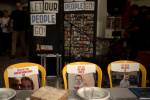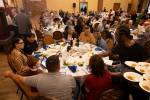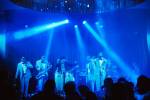Oprah loses bet with readers over ‘Freedom’
 In December, Jonathan Franzen is due to, finally, grace Oprah Winfrey’s stage. You’ll remember, of course, the controversy surrounding them and his previous novel, “The Corrections.”
In December, Jonathan Franzen is due to, finally, grace Oprah Winfrey’s stage. You’ll remember, of course, the controversy surrounding them and his previous novel, “The Corrections.”
Well, the hatchet’s been buried and, now, again, people everywhere are reading hardcovers of Franzen’s book slapped with Oprah’s sticker. A masterpiece, she called “Freedom,” before betting that it would be one of the best novels you and I have ever read.
Well, here in Vegas we take our wagers seriously. And, Oprah, you lose.
Yes, I’ll grant you, “Freedom” is the most ambitious novel to hit the shelves in some time. And yes, its pages are abundant with genius. Franzen’s a brilliant writer — a master of words and sentences — with a sharp eye for human frailties, failings and sore spots, and a willingness to poke at these as an author should. But Franzen’s poking smacks of bullying, and this is “Freedom’s” downfall: It’s hard to care about characters that the author so obviously disdains.
Still, some critics hail it the novel of the decade — due, in part, to the Tolstoyish scope of the book. It hits on just about every current event and concern of the 10 years it took Franzen to write it. Think of various political, environmental, economical and personal ramifications of freedom: arms deals, mountain top removal mining, endangered species, suburban sprawl, anti-depressants and, well, everything else.
Beyond all this, “Freedom” examines the lives and marriage of Walter and Patty Berglund, a young, mostly happy couple in St. Paul, Minn. Walter is a lawyer working for a 3M multinational conglomerate. Patty is a former college basketball star and a stay-at-home mom. They have a daughter (who plays a minimal role) and a son, Joey, whom Patty favors to an objectionable extent. As does Franzen, Joey’s subplot, like other runaways within the book, consumes far more pages than it warrants.
Enter Richard Katz, a sexy rock star and Walter’s former college roommate, to complicate things. This in the second section — aptly titled “Mistakes Were Made” — that takes the shape of an autobiography penned by Patty in an awkward third-person narrative which Franzen’s own talent works to undermine. The result is a drawn-out piece of Patty’s immature and amateur writing peppered with Franzenesque strokes of grace and genius. It’s distracting, to say the least.
Another shortcoming is Franzen’s inability to understand so much about his female protagonist, and I expect Oprah’s audience will take him to task for this. Franzen doesn’t even broach the finer details of Patty’s character-defining experiences, opting to handle the occurrences of motherhood and rape with irresponsibly broad strokes — as compared to the nitty-gritty details he piles on Joey’s sexual exploits, and so much else.
The third part of “Freedom” begins with a study of Richard Katz’s aversion to mainstream success, a story that hums vaguely of Franzen’s own:
The most traumatic events ever to befall the longtime front man of the Traumatics had been (1) receiving a Grammy nomination, (2) hearing his music played on National Public Radio, and (3) deducing, from December sales figures, that Nameless Lake had made the perfect little Christmas gift to leave beneath tastefully trimmed trees.
This section fascinated me, albeit, in the perverse way I might gawk at a train wreck. Perhaps I’m too much a product of our reality-based culture, but the Berglands’ melodrama couldn’t, for me, compete with the real drama that perpetually hounds Franzen. A notably quiet, seemingly honest, seemingly tortured man, Franzen has a tendency to attract large-scale controversy. To understand Katz is, I think, to better understand Franzen.
But back to the book. Would I recommend it? Well, not to everyone. Certainly, if you’re the literary type, you must read it, because it’s bound to be a subject of debate for years to come. If “The Corrections” left you a Franzen-lover or a Franzen-hater, “Freedom’s” good for refueling the passion — either way. The sheer magnitude of its aspiration — to encapsulate modern America within 562 pages — makes it a worthy read. The warm, fuzzy, un-Franzen-like ending is rather satisfying, too. But, no, I won’t be shelving it amongst my favorite novels of all time.
Oprah, honey, pay up.

















